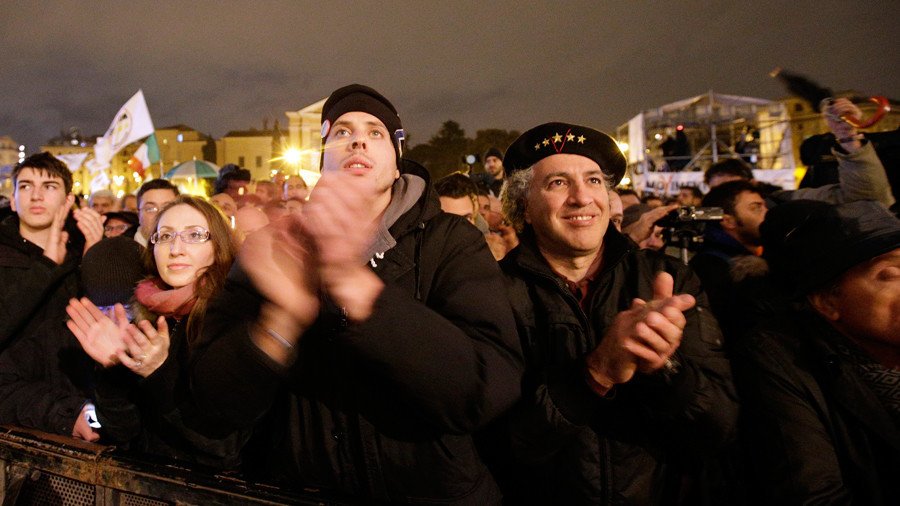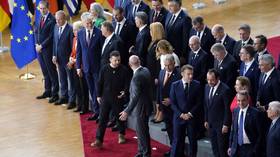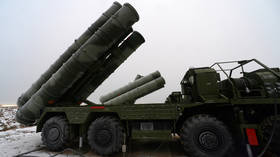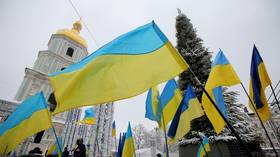Ex-Obama UN envoy blames Russia for anti-establishment success in Italy’s elections

One of the key people behind the policies that destabilized Libya and Syria, causing a flood of refugees to Europe, accused Russia of influencing the Italian elections after voters gave the cold shoulder to establishment parties.
Russia’s utility as the universal scapegoat cannot be underestimated these days. A historically-separatist region votes for independence? Russia! Somebody on the internet smeared your candidate? Russia! Extreme cold comes from the east? Er… Russia probably still wants “thousands and thousands and thousands” killed by the cold, as one member of the UK cabinet claimed, and sells its gas to freezing Britons as deception.
In the past 2 years, Putin has won elections in the United States, Austria, Czechia & now Italy. He's also delivered Brexit & performed well in France & Germany. It's because there are no problems in the west & a large amount of people only vote to make Russia happy. pic.twitter.com/4XATeOSTEO
— Bryan MacDonald (@27khv) March 5, 2018
So it’s no surprise that the outcome of the latest election in Italy, which resulted in a surge of anti-establishment forces, would be blamed on Moscow. For instance, here is Samantha Power, formerly a senior official in the Obama administration, sharing an article in the Spanish newspaper El Pais about how Russia allegedly spun an immigration discourse in Italy.
Italy’s joins long list of elections influenced by Russia. Sputnik will do what Sputnik does. The question is: what are our democracies going to do about it? Will voters repudiate candidates who seek to benefit from Russian interference? https://t.co/JbFe35Sw5n
— Samantha Power (@SamanthaJPower) March 5, 2018
The Spanish article is a hit piece based on social media analysis done by a private firm, claiming the Russian news outlet Sputnik and the almighty Russian bots made the discourse in Italy radicalized on the issue of immigrants. Because Italians, obviously, cannot be genuinely unhappy to be living in a country that also happens to be a primary destination for refugees departing across the Mediterranean Sea from Libya and have no right to feel betrayed by Brussels’ immigration policies.
But the criticism is precious coming from Power, a staunch advocate of America’s “humanitarian interventions” by the military since Yugoslavia and onwards. During her tenure as member of the National Security Council and later ambassador to the UN in the Obama administration, this pretext was used to destroy Libya, which had served as a barrier for irregular immigration to Europe under strongman Muammar Gaddafi and has now turned into a hotbed for people smugglers. It was also used to justify the arming of militants in Syria, perpetrating the war that displaced millions of people. Power advocated a direct military intervention, Iraq-style.
How long after the #ItalianElection2018 until someone claims the Russians did it?
— Jonathon Davies (@JonD99) March 4, 2018
The Twitter post has gained plenty of angry responses. People reminded Power of numerous interventions Washington had its fingerprints on, calling her position ‘ludicrous’. But don’t let them shake your convictions - they are all surely just Russian bots doing the Kremlin’s bidding.
Sunday’s election has shaken the political scene in Italy, seeing voters ditch the ruling center-left parties and switch to anti-establishment forces. The Euroskeptic Five-Star Movement came out as the top individual party, winning over 32 percent of the vote, while anti-immigrant Lega Nord party outperformed expectations, garnering over 17 percent.
A center-left bloc led by ex-Prime Minister Matteo Renzi from Italy's Democratic Party, gained some 23 percent, admitting “a very clear defeat” in the election. Political analyst Daniele De Bernardin believes that people voted for change on Sunday, not for a particular party.
“In the last five years we had a lot of party switching in the country. Five Star Movement is a movement that puts together very different people with different views,” he told RT, adding that the party can be viewed as a “post-ideological movement.”
What’s putting people together is in fact “a sentiment of changing the country,” he concluded.
Like this story? Share it with a friend!














